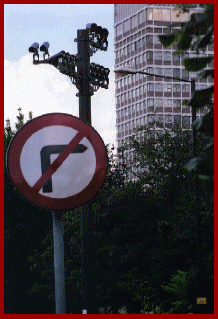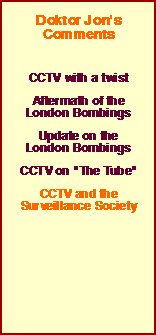| ||||||||||||||||||||||||||||||||||||
Welcome to | ||||||||||||||||||||||||||||||||||||
 | ||||||||||||||||||||||||||||||||||||
 | ||||||||||||||||||||||||||||||||||||
Doktor Jon's Comments | ||||||||||||||||||||||||||||||||||||
These days, you can hardly open a newspaper or switch on the telly, without being bombarded with stories about video surveillance, or digital CCTV, or indeed many less than glowing references to Big Brother; so what exactly is the state of surveillance in Britain today? Well generally speaking, it's either regarded as a sure fire vote winner and the greatest thing in crime fighting since the invention of the tin whistle, or one millimetric step away from a bottomless Orwellian abyss. The truth of course tends to lie somewhere in the middle, but then the problem of quantifying the merits or otherwise in using this technology, are somewhat diluted by a fundamental misunderstanding about exactly what the use of Closed Circuit Television means to our modern society. Although most people consider the now widescale adoption of CCTV as a relatively new phenomenon and something to be enthusiastically embraced, the UK is actually charging headlong into a “third age” of video surveillance, with little if any informed discussion on the benefits and outcomes we could perhaps expect over the next five to ten years. It was not so long ago that the Information Commissioner Richard Thomas, was warning of Britain “sleepwalking” into a surveillance state, and yet a report commissioned by his own office and published in September 2006, actually leads with the statement “We live in a surveillance society. It is pointless to talk about surveillance society in the future tense.” To industry insiders, this apparent revelation was no more a surprise than the realisation that successive academic reports into the effectiveness of CCTV in tackling crime, have only served to highlight a hidden technical conundrum, which impacts hugely on the way in which cameras are frequently failing to fulfill their potential, or live up to expectations, depending on your particular point of view. Time and again, reviews are published which throw in to question whether CCTV actually works, but almost without exception, there is a significant flaw in the presentation of the data. When reporting on technical efficiency, it is naively assumed that the systems have been correctly profiled, designed, installed and operated, to achieve the highest levels of efficacy. In practice, little could be further from the truth. Generally speaking, there is no wider public realisation that Closed Circuit Television, CCTV, video surveillance or whatever else you want to call it, is actually a discipline that relies on the expert application of a huge range of tools and techniques, in order to address the unique set of demands and circumstances found in any given location. Whilst Joe Public may see the working end of a system as simply a remote control camera stuck on a pole in their local high street, possibly a couple of miles away from the ‘state of the art' control room, the inescapable fact is that much of our existing CCTV is actually working at a very low level of technical efficiency, and indeed in many situations, is little more than a labour intensive exercise in lottery surveillance. Now if that sounds a rather harsh indictment of an industry that is blessed with an abundance of positive perception, then I make no apology for saying that an open and informed debate, on both the way that video surveillance is currently being embraced and the shape of things to come, is now well overdue, if not already too late. Much has been remarked just recently on the use of Automatic Number Plate Recognition (ANPR) systems, and how vehicles can be tracked through a network of cameras, much as is presently done with the London Congestion Charge scheme. At present, as a law enforcement tool it is undoubtedly extremely useful indeed, but then it isn't 100% accurate, and also not without its very own achilles heel. The recently leaked Home Office memo which highlights the intention of possibly using all available traffic monitoring cameras to provide “real time” tracking of vehicles, really shouldn't provide any great surprises, given previously well publicised announcements on future operational intentions. | ||||||||||||||||||||||||||||||||||||
 | ||||||||||||||||||||||||||||||||||||
IMPORTANT: No material may be reproduced, copied or redistributed from this site, © doktorjon.co.uk 2004 - 2008 Homepage...:...Gateway...:...Technical Gateway....:....Quickfind Index....:....Equipment Directory | ||||||||||||||||||||||||||||||||||||


